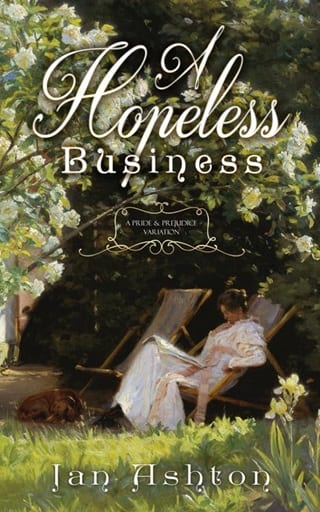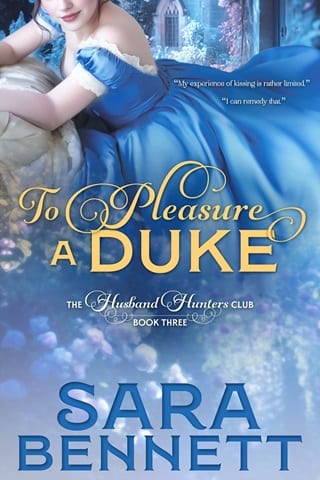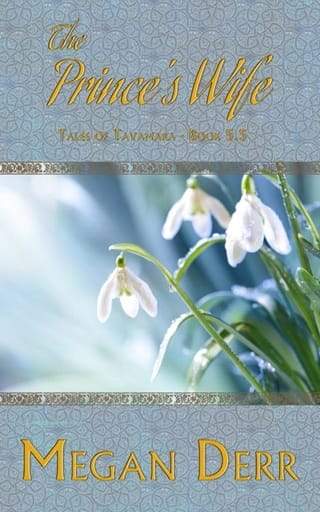Chapter 9
CHAPTER NINE
February 1812
D espite Mrs Bennet's continued reminders of Mr Collins's betrayal and his choice of a wife and Elizabeth's own melancholy, which she attributed to disappointment in her friend, the next two months passed pleasurably enough as witness to the deepening connexion between Jane and Mr Bingley. It was a marvellous thing, really, to watch two people so well-matched falling in love. After all, not every match was based on such affection. Henry Goulding loved Alice Welby but the marriage between his sister and her husband—a vicar in York who was the second son of a baronet—was based as much on his need for her dowry and her desire for a life outside of Meryton. Charlotte had married Mr Collins to escape spinsterhood and have her own home and family; the fact that she would have to share that home and create a family with such a man had little bearing .
I wish for more.
Charlotte might not be romantic, but Elizabeth found it difficult to resist the pull towards an attachment based on the heart when seeing the looks exchanged between her sister and Mr Bingley. She wished for someone besides her father with whom to admire it; as pleased as Mr Bennet was for Jane forming an alliance, he seemed to derive more enjoyment from poking fun at Mr Bingley.
It was true, he was young and rather puppyish; the absence of Mr Darcy, his friend and guide, however, had seemed to steel something in him. Or perhaps it was the presence of his family—two elderly aunts from Scarborough, brought to Netherfield by a distant relation who seemed overawed by the house—and Hurst's cousins that emboldened Mr Bingley to more fully assume the mantle as head of his family. If Elizabeth thought Mr Darcy would be proud to see it, she kept that thought to herself. After all, the loyalties of her two closest confidantes had shifted.
She did try with Kitty, thinking there might be some possibility that she was more intelligent when without Lydia's company, asking her about the plaiting she had done when remaking a bonnet. It did not work; Longbourn was too crowded, too full of spies, interruptions, and inanities.
Sensible conversation? A rational exchange of observations, be it about trees or difficult men? Such pleasure had ridden off with Mr Darcy. Elizabeth could not say she missed him—in truth, she scarcely knew the gentleman, having spent a total of perhaps five hours in conversation with him over the course of less than two months. Regretting his absence, however, was an easier confession. She avoided thinking about why she had disdained his company for weeks, thinking him cold and proud, and over the course of one afternoon's close confinement, had found him earnest and interesting.
How perverse that the mysterious Mr Darcy grows warmer in personality in the damp and cold, and assumes that cool formality when placed in a comfortable room.
Any disappointment Elizabeth had felt that Mr Darcy had not returned to Netherfield was dashed away on the bright February morning Jane emerged from the parlour with Mr Bingley and whispered to her, "We are engaged."
Happy as she was for Jane—and relieved though she was for herself that Mrs Bennet now had a wedding to plan—Elizabeth had her own entanglement to manage. She was contending with the attentions of Mr Hurst's cousin, Mr Nugent, a plump man of twenty-two years who had joined the Netherfield party just before the New Year.
From their first introduction, Mr Nugent had assumed them friends, amusing her with whispered bon mots about the company and wicked memories of his cousin's youth. His insouciance was diverting, and Elizabeth exerted herself to keep his jibes away from the ears of Lydia and Kitty, whose laughter would be far too raucous. After two weeks' acquaintance, her capacity for such amusement exhausted, Elizabeth was exerting her own exile from his company. At every dinner, he managed a chair next to hers. At every call to Longbourn or Netherfield, he found a seat by her. He was persistent in his desire for her company, unfailing in declaiming her wit, and tireless in expressing his admiration for her honesty and intelligence .
And yet, for all that Mr Nugent offered her in praise, Elizabeth could only think him tiresome. A puppy who cannot learn or be trained and was allergic to gravity and sense. He is no Mr Collins, yet, in my twentieth year, I have succeeded in beguiling the two most absurd men of my acquaintance.
Miss Bingley was laughing at her, she was certain of it.
"My dear Eliza," she said coyly one afternoon at Longbourn while Jane was occupied with Mrs Hurst and a fashion magazine, "how have you managed it? In the half year of our acquaintance, you have caught the eye of two eligible gentlemen, each of whom may boast a steady income and admirable oratorical skills. Of course, your cousin has since made a love match, but dear Mr Nugent is a particular prize, as he can offer you a house in town and an invalid mother-in-law ensconced in the mistress' suite. The house is small but comfortable, though nothing to Longbourn," she added wickedly, her eyes fixed on a deep scratch in the table between them. "When shall I wish you joy?"
Elizabeth returned Miss Bingley's expectant smile. "We shall soon be sisters, and in our family, we respect our elders, including on order of marriage. Thus, your joy must come before mine. Do confide in me, are you enjoying the attentions of some eligible gentleman in town?"
She lifted the teapot. "More tea?"
Of course, discourtesy to Miss Bingley would solve none of the dilemmas she faced nor hasten the return of a gentleman whose conversation was more pleasurable than any other to be found in Meryton. In May, Mr Darcy surely would come to Meryton for the wedding; but it was only February. Solace could be found in the out of doors—if she could be there alone.
In the four or five years before she reached her twentieth birthday, Elizabeth had relished the great freedom of her solitary walks. She would go early, when most of Longbourn was still abed, or in mid-afternoon, when callers were less frequent and her family was occupied or resting. Of her four sisters, only Kitty truly enjoyed tramping in the wood but after the onset of a chronic cough the previous spring, she had confined her walks to Lucas Lodge and into Meryton. "Not everyone has the constitution for or enjoyment of the damp forest," Mrs Bennet proclaimed. Elizabeth was sorrier for Kitty than for herself; without outdoor occupation, she had sunk more deeply under the influence of her younger sister.
Still, Elizabeth was content, especially after the trepidation she had felt during Mr Collins's visit. She had escaped his company on four occasions before he succeeded in following her to make his unwanted proposal. Although he had returned to Hunsford, she could not set aside a sense of caution when walking alone. Her intuition was not wrong. She had scarcely reached the edge of the lane at the end of Netherfield's long drive when she heard the sound of hoofbeats rounding its curve. All too quickly she saw it was Mr Nugent and Mr Hurst; their grooms, each with a covey of birds dangling from their saddles, rode behind .
"Miss Elizabeth, how wonderful to find you here. We were just returning to Netherfield with this evening's dinner."
"It appears the pheasants were amenable to your invitation to join you at the table."
Both men looked momentarily confused before Mr Hurst guffawed. "Indeed. The birds were happy to make our acquaintance and will have place of honour on my plate." He gestured back to the grooms. "Take those to the kitchens for dressing and get yourselves a cup of warm ale."
Mr Nugent's attention remained on Elizabeth, a benign smile aimed in her direction. She wondered whether he had yet understood her joke. He was not the cleverest man, after all. When his cousin called his name, he turned to Mr Hurst, who said to him, "I wish for some brandy and a change of clothes. I shall see you at the house." Then the older, ruddy-cheeked man nodded to Elizabeth. "Good day to you. The wind is blowing colder. Best not to get caught out in another storm."
Mr Hurst's admonition was not unkind, precisely, but he chuckled as he turned his horse away. Suddenly Mr Nugent was by her side, his reins in hand. "May I accompany you to Longbourn?"
Elizabeth wished to deny him the pleasure, but instead nodded and began to walk towards her home. She was grateful for the unusual silence that befell them but chose to respect it, to refrain from pointing out foliage or asking of the hunt, in order to preserve it. However, her demeanour disturbed Mr Nugent.
"You are quiet. All is well? You are not fleeing an argument with a sister or hunting for nature's bounty? "
"I am enjoying nature's bounty." She gestured at the sky. "It is blue above me, some semblance of green peeks through the brown around me, and the air is crisp and redolent of all that late winter offers in its brief hold before spring's arrival."
"You are a poet, the way you craft your thoughts into beautiful prose! Do go on!"
"I am neither a poet nor even a writer?—"
"But you fill my head with such thoughts and images with your words."
Because you are a simpleton , she thought before replying, "You must read verse to understand the difference between mere description and true poetry."
"Was that Shakespeare, then?"
She shook her head and sighed quietly. Mr Nugent was not discouraged by his lack of understanding; clearly he did not recognise it nor any other deficiency in their rapport as he began rattling on about his admiration of a good, solid oak table and the majesty of a horse he hoped to purchase. They passed a tenant's cottage, which Elizabeth had always marked as a milepost on the road to Longbourn. When Mr Nugent let out an affected sigh and slowed his step, Elizabeth fought the urge to quicken her own.
"Miss Elizabeth, this is, for me and I hope for yourself, a truly fortuitous meeting. You see, I had hoped to call on you tomorrow morning at Longbourn."
This was not a promising beginning to any conversation with Mr Nugent. She replied quickly. "My mother will always welcome visitors?—"
"Your mother is not my concern. It is you I wish to speak to, and to your father. "
Alarm flooded through her. "My father, as you know, is surrounded by ladies and will enjoy the steadier conversation you offer him."
"Ah, but you are the steady one, Miss Elizabeth. So clever, so able to understand all that is said and guess at what is being withheld in thought. I admire that, so very much."
Elizabeth willed herself not to blush at his pretty words. She quickened her pace, wishing the three miles between the estates could be halved. They had gone scarcely a mile while he prattled on about horses and table legs.
"Many would not agree, sir. Cleverness and wit are nothing to amiability, arts, and affluence."
"See—there, you have done it yet again," he cried, his flushed face crinkling in amusement. "Oh, Miss Elizabeth," he said, suddenly sobering. "You are such a delightful creature. I love to laugh and no one has made me laugh as you do—although at times, I only half-understand you, I wish to spend my lifetime in the attempt of it. I am nothing if not earnest."
She pretended not to hear him. "I am nothing if not late, sir. I had promised Mary I would practise with her."
"You are a wonderful sister. Bingley is a lucky man, for he too shall claim you as sister."
Would it not rain? Could she summon a crack of thunder?
"I wish a different title." Mr Nugent dropped the reins and stepped in front of her. "This is not how I envisioned it but the expression on your face tells me this is the moment of greatest expectation, and that happiness can follow only if you agree with my wish to marry you. "
All within her went cold and hot, and she felt almost faint with desperation. Not again. Not another unwanted suitor whose hopes and skill in professing admiration ran ahead of discernment and wisdom. "Mr Nugent, you are everything kind but I fear a gulf of understanding lies between us. In our brief acquaintance, we have become friends?—"
"Brief? I say, we have dined together nine times in the past weeks, and had tea on seven occasions! We have walked, sat together, and always in perfect harmony. It is more than amity and friendship, Miss Elizabeth, but a brilliant sparkle of mutual opinion and thought!"
"I thank you, sir, for no one has ever associated me with brilliance or sparkle, but I beg you to refrain from any further interest in my company."
"Has another man bested me and made his claim on your heart?"
She nearly laughed, clamping a hand across her mouth to stifle any outburst. Mr Nugent's beseeching expression, his round cheeks red with emotion, quickly sobered her. He was scarcely older than herself and, though rather thickwitted, he was a sweet young man. An eager, na?ve, decent young man who needs to follow Mr Bingley's path and find a wise and trustworthy friend to guide him in the world. He needs his own Mr Darcy.
No, Mr Darcy was the last man she should be thinking of at this moment. She might suggest to Mr Bingley that outside of a cardroom or pheasant hunt, Mr Hurst was a poor role model for his cousin, but what to say at this moment to Mr Nugent—who looked as he so often did: perplexed. Over his shoulder, only a hundred or so yards away, she could see Lydia and Kitty walking down the drive from Lucas Lodge. They, her silliest sisters, would be her escape. One might even prove Mr Nugent's salvation.
Elizabeth raised her hand and waved to them.
 Fullepub
Fullepub 



